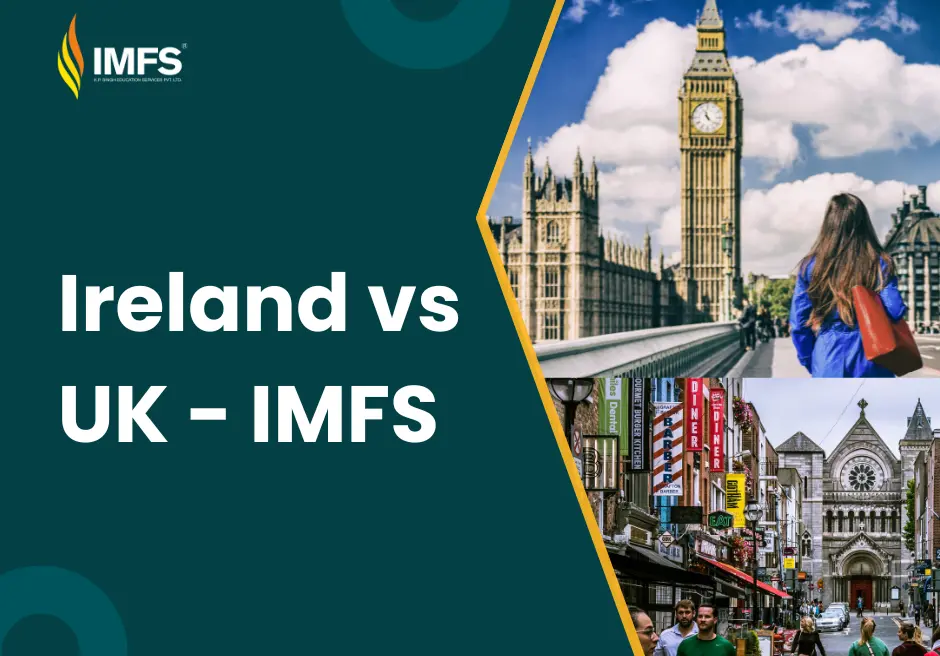Ireland vs UK for Indian Students
Embarking on your international higher education journey is an exhilarating yet momentous decision. As you meticulously consider your options, two prominent destinations likely surface – Ireland and the United Kingdom (UK). Both boast esteemed universities, vibrant cultures, and many academic opportunities. However, discerning the ideal fit for your aspirations requires a deeper exploration. This comprehensive guide delves into the critical aspects of studying in Ireland and the UK, empowering you to make an informed and confident choice.

Ireland: A Haven for Personalized Learning and Cutting-Edge Research
Ireland’s universities prioritize individualized attention and academic rigor. Trinity College Dublin, University College Dublin, and the University of Galway excel in STEM, IT, and Life Sciences. Explore the mysteries of marine biology at the National University of Ireland Galway or delve into artificial intelligence at Trinity College Dublin. Ireland is ideal for those seeking a research-intensive environment.
The UK: A Gateway to Prestigious Institutions and Diverse Disciplines
The UK is a global leader in higher education, housing some of the world’s most prestigious universities, including the University of Cambridge and Oxford. These institutions boast a rich history and a legacy of academic excellence. Across a vast spectrum of disciplines, the UK offers a comprehensive array of programs catering to students with diverse educational interests. Whether you’re captivated by the allure of English Literature at Oxford or yearn to delve into the intricacies of Mechanical Engineering at Imperial College London, the UK education system provides a fertile ground for intellectual exploration. The UK’s rigorous academic standards ensure you’ll graduate with a globally recognized qualification, equipping you for success in your chosen field.
Charting Your Course: A Comparative Glimpse
Ireland and the UK offer many popular programs, each catering to specific strengths. Here’s a breakdown to illuminate their offerings:
- Ireland: A haven for those seeking expertise in Computer Science & IT, Business & Finance, Law, Engineering, Medicine & Health Sciences, Social Sciences, Pharmaceutical Sciences, and Creative Arts & Design.
- UK: Offers similar programs to Ireland, with a potentially broader range of options in certain domains like Arts & Humanities. It boasts a rich literary and historical tradition.
Unveiling the Gates of Academia in Ireland
Undergraduate Admissions:
- Academic Qualifications: Irish universities typically seek applicants who have completed secondary education and possess a Leaving Certificate. International students might be required to present equivalent qualifications, such as A-levels or the International Baccalaureate.
- English Language Proficiency: If English isn’t your native tongue, demonstrating fluency is essential. IELTS or TOEFL scores are the standard methods, and the minimum score requirements can differ between institutions. Generally, these range from IELTS 6.0-6.5 or TOEFL iBT 80-90.
- Program-Specific Requirements: Certain programs, like medicine or veterinary science, may have additional requirements like entrance exams or interviews.
Postgraduate Admissions:
- Academic Background: A bachelor’s degree or equivalent qualification relevant to your chosen program is typically necessary. Some programs might have specific grade or GPA requirements.
- English Language Proficiency: Unlike undergraduate studies, showcasing English proficiency through IELTS or TOEFL is mandatory.
- Recommendation and Statement of Purpose: Many postgraduate programs require reference letters from professors and a statement outlining your research interests and career aspirations.
- Entrance Exams: Some highly competitive postgraduate programs may necessitate GRE or GMAT scores.
Navigating Admissions in the UK
Undergraduate Admissions:
- Academic Qualifications: UK universities generally require A-levels or equivalent qualifications for undergraduate programs. International students may also need to verify the equivalency of their qualifications.
- English Language Proficiency: Demonstrating English fluency is essential through IELTS or TOEFL scores. Required scores can vary but often fall within the range of IELTS 6.0-6.5 or TOEFL iBT 80-90.
- UCAS Application: Most undergraduate applications in the UK are processed through the centralized Universities and Colleges Admissions Service (UCAS). This system allows applications to multiple universities and programs through a single application.
Postgraduate Admissions:
- Academic Background: A relevant bachelor’s degree or equivalent is necessary; some programs might have specific grade requirements.
- English Language Proficiency: Like undergraduate programs, English proficiency is required, often demonstrated through IELTS or TOEFL.
- Reference Letters and Personal Statement: Postgraduate applications often involve reference letters and a personal statement detailing your academic and research interests.
- Research Proposal: Research-based master’s and Ph.D. programs may require a research proposal outlining your proposed project.
- Entrance Exams: Some postgraduate programs may require GRE or GMAT scores, particularly in competitive fields.
Understanding these admission requirements will help you prepare effectively for your journey to higher education in Ireland or the UK.
Cost of Living in Ireland
- Housing Renting accommodation in Ireland, especially in major cities like Dublin and Cork, can be pricey. For instance, a one-bedroom apartment in the city center might set you back anywhere from €1,200 to €2,500 monthly. Suburban areas might offer somewhat more affordable options.
- Food Expenses Grocery prices in Ireland are similar to those in other Western European nations. On average, a student’s monthly grocery bill could range from €200 to €300, depending on their lifestyle and dietary preferences.
- Transportation Costs Irish cities boast well-developed public transportation systems, with Dublin’s buses and trams particularly popular. Expect to pay around €100 monthly for a transportation pass in Dublin.
- Healthcare Expenses Healthcare in Ireland involves a combination of public and private services. International students typically need private health insurance, which could cost approximately €500 to €1,000 annually.
- Utility Bills Utilities like electricity, heating, water, and waste disposal usually total around €100 to €150 per month.
Cost of Living in the UK
- Housing Housing costs in the UK vary widely by location. Notorious for its high rents, London may demand £1,500 to £2,500 per month for a one-bedroom apartment in the city center. In other cities like Manchester or Birmingham, accommodation tends to be more affordable.
- Food Expenses Grocery prices in the UK are on par with those in Western Europe. A student’s monthly groceries might range from £150 to £250.
- Transportation Costs The UK boasts an extensive public transportation network, especially in cities such as London and Manchester. Monthly transportation passes could cost anywhere from £70 to £150.
- Healthcare Expenses Healthcare in the UK is primarily provided through the National Health Service (NHS), funded through taxation and generally accessible to students.
- Utility Bills Utility costs in the UK, covering electricity, heating, water, and internet, might total around £100 to £150 monthly.
The cost of living in Ireland is slightly lower than in the UK, albeit marginally.
Deciding between Ireland and the UK extends beyond academics. A thriving job market where you can leverage your skills is crucial. Here’s a breakdown to illuminate career prospects in each nation:
Ireland: A Hub for Innovation and Technology
- Booming Tech Sector: Ireland is a European leader in the technology sector, attracting major multinational companies like Google, Apple, and Facebook. This translates to many opportunities in software development, data analysis, and cybersecurity.
- Life Sciences and Pharmaceuticals: The life sciences and pharmaceutical industries significantly contribute to the Irish economy. Ireland offers promising career paths if your expertise lies in biotechnology, medical devices, or pharmaceuticals.
- Skilled Worker Shortage: Ireland experiences shortages in skilled professionals across various sectors, including engineering, finance, and healthcare. This creates a favorable environment for international graduates with specialized skill sets.
- Minimum Wage: Ireland’s minimum wage is generally higher than the UK, offering a more competitive starting salary.
UK: A Diverse and Connected Marketplace
- Financial Powerhouse: London, the UK’s capital, is a global center for finance. The UK offers unparalleled access to prestigious financial institutions if your aspirations lie in banking, investment, or accounting.
- Broad Spectrum of Industries: The UK economy is highly diversified, encompassing engineering, manufacturing, and creative industries. This translates to a broader range of job opportunities compared to Ireland.
- Global Network: The UK’s historical ties and solid international connections open doors for careers with multinational companies worldwide.
- Highly Competitive Landscape: The UK job market is highly competitive, especially in major cities like London. Standing out might require additional qualifications or relevant work experience.
When deciding between studying in Ireland or the UK, individual preferences, goals, and circumstances should be taken into consideration as both countries offer excellent educational opportunities, world-renowned universities, and unique advantages.


